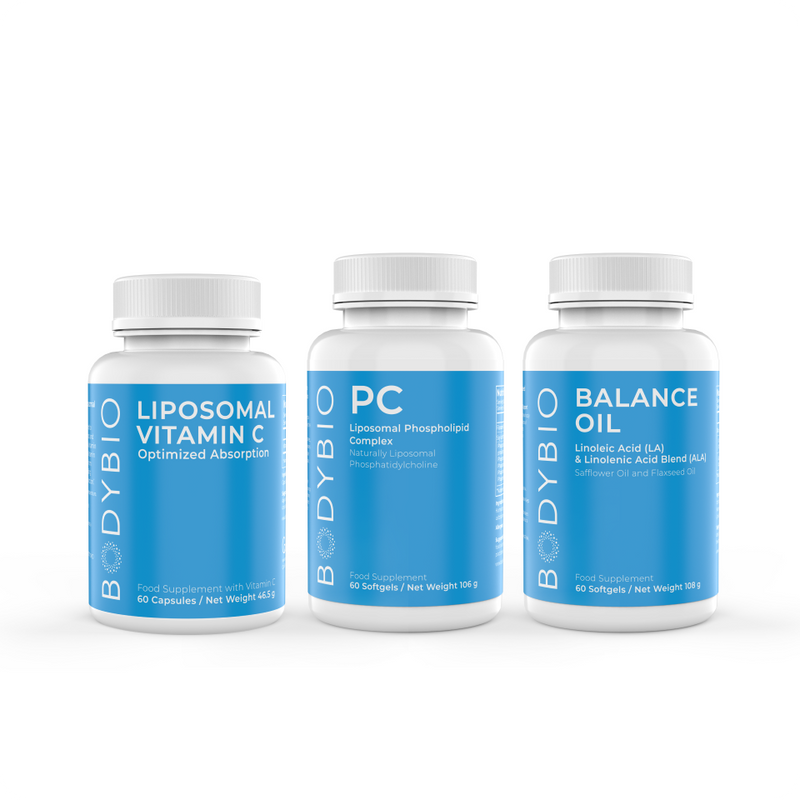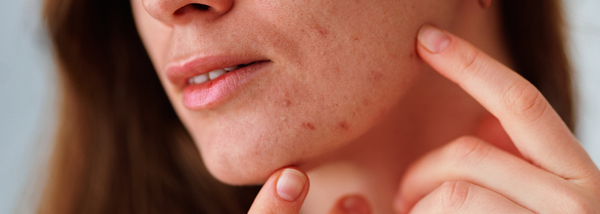How Stress Hormones Damage Your Skin (and What You Can Do About It)
Key Takeaways:
If you've noticed your skin acting up during your most stressful moments, you're not imagining the connection. Stress acne has a timing that feels almost downright vindictive. It shows up right before your biggest work presentation, that long-awaited vacation, or an important social event. For many adults, especially those juggling careers and life responsibilities, these breakouts aren't just cosmetic annoyances. They're visible proof that something deeper is happening inside your body.
The relationship between stress and skin health runs much deeper than surface-level blemishes. When your stress response system stays activated for weeks or months, it creates a cascade of hormonal changes that your skin pays for.
What's really happening is that chronic stress disrupts your skin's protective barrier and accelerates inflammation, but you can actually reverse this damage through targeted stress management and nutritional support. This guide will walk you through exactly how stress hormones damage your skin, which conditions are most affected, and science-backed strategies that can help.
Table of Contents:
-
How Stress Disrupts Your Skin at the Cellular Level
-
How to Tell When Stress is Affecting Your Skin
-
Common Stress-Related Skin Conditions
-
Managing Stress for Healthier Skin
-
Supporting Your Skin from the Inside Out
-
Building Long-Term Skin Resilience
How Stress Disrupts Your Skin at the Cellular Level
Here's what most people don't realize: your skin isn't just a passive victim of stress. It actually has its own stress response system that can work against you when life gets overwhelming.
The HPA Axis and Cortisol Production
The moment your brain perceives stress, it activates your hypothalamic-pituitary-adrenal (HPA) axis. Your hypothalamus releases corticotropin-releasing hormone, which signals your pituitary gland to release adrenocorticotropic hormone. This travels to your adrenal glands, triggering them to pump out cortisol, your body's primary stress hormone.
This stress response system evolved to handle short-term emergencies. Cortisol levels spike to help you deal with immediate challenges, then naturally decline so your body can return to repair functions. Modern life keeps this system activated far longer than nature intended.
Your skin contains cortisol receptors (as do many other organs and systems), making it a direct target of stress hormones. Recent studies reveal that your skin actually produces its own cortisol through an enzyme called 11β-hydroxysteroid dehydrogenase type 1. During stressful periods, your skin becomes both victim and participant in its own stress response.
What Happens When Cortisol Stays High
When cortisol levels stay elevated for weeks or months, your skin starts paying the price in several measurable ways.
Cortisol directly tells your sebaceous glands to produce more oil than normal. This extra sebum mixes with dead skin cells and bacteria, setting up the perfect conditions for those deeper, more stubborn breakouts that seem to appear out of nowhere.
Chronic cortisol exposure also disrupts how well your skin holds onto moisture. Studies demonstrate that stressed individuals can lose up to 40% more moisture through their skin compared to when they're relaxed. Your protective barrier literally starts breaking down.
The healing process slows down too. Cortisol interferes with your body's natural collagen production and cell repair processes, which means cuts, blemishes, and irritation stick around much longer than they should. Chronic stress also keeps your body in a state of low-grade inflammation. This creates an environment where your skin ages faster and simply can't function at its best.
How to Tell When Stress is Affecting Your Skin
Your skin has its own way of waving the white flag when stress becomes overwhelming. Unlike a headache or tight shoulders that you feel immediately, skin changes from stress can be more subtle at first, then suddenly impossible to ignore.
The changes follow a predictable timeline as cortisol builds up in your system:
|
When It Appears |
What You Might Notice |
Why It's Happening |
|
Days 1-3 |
Skin feels tight, looks dull, products seem less effective |
Cortisol starting to disrupt your skin's barrier function |
|
Days 3-7 |
New breakouts appear, especially around jawline and chin |
Oil production ramping up from sustained cortisol exposure |
|
Week 2+ |
Product sensitivities develop, cuts and blemishes heal slowly |
Barrier breakdown and chronic inflammation are taking hold |
You might also notice your usual skincare routine isn't working the way it used to. That serum that always gave you a glow now seems to do nothing, or your skin feels angry after using products that never bothered you before.
The Stress-Skin Timeline
Stress-related skin changes appear with a delay because cortisol needs time to accumulate and disrupt normal cellular functions. Conditions like eczema might emerge up to a week into a challenging period, while other stress responses can vary based on individual factors.
Common Stress-Related Skin Conditions
While stress affects everyone's skin differently, certain conditions are notorious for flaring during challenging times.
If you've ever noticed breakouts appearing right before a big deadline or presentation, you're not imagining things. Students consistently experience more acne during exam periods compared to their breaks. These stress-induced breakouts tend to be deeper and more stubborn than your typical monthly hormonal acne.
Eczema can be even trickier. Not only does stress make flare-ups worse, but people with eczema often have impaired stress responses, creating a frustrating cycle where the condition makes it harder to cope with the very thing that triggers it.
For people with psoriasis, stress is often enemy number one. Most people with psoriasis can point to stress as a major trigger for their flare-ups. Stress can also cause hives to appear out of nowhere and make rosacea flares more frequent.
Stress doesn't just target your face. Hair loss from stress typically shows up about 3 months after a major stressful event, while chronic stress can make your nails brittle and slow their growth.
Managing Stress for Healthier Skin
People who actively work on managing their stress consistently see improvements in both how they feel and how their skin looks. You don't need to completely overhaul your life to see benefits.
Simple Techniques That Actually Work
Mindfulness and short breathing exercises can make a real difference. Even 10-15 minutes of daily meditation helps regulate your body's natural cortisol rhythms. If formal meditation feels overwhelming, try simple breathing techniques like "box breathing" —inhale for 4 counts, hold for 4, exhale for 4, hold for 4, and repeat until your body starts to relax.
Movement matters, but timing is everything. When your body is already stressed, intense workouts can actually make things worse by releasing more cortisol. Gentle movement such as walking or yoga in the morning or afternoon (not before bed) tends to be most supportive for both stress levels and skin health.
Sleep quality directly impacts your skin's ability to repair itself overnight. Poor sleep disrupts your natural cortisol rhythm, keeping stress hormones elevated when your skin needs them lowest.
Nutritional Support for Your Stress Response
When you're constantly stressed, your body burns through certain nutrients faster than you can replenish them through food alone. Your nervous system starts working overtime, which means it needs more fuel to keep functioning properly.
BodyBio Calm was designed specifically for this challenge.* Instead of just throwing random "calming" ingredients together, each component targets a different part of your stress response system.*
-
Phosphatidylserine helps regulate cortisol production so your stress hormones don't stay elevated all day.*
-
Herbal adaptogens like rhodiola support your adrenals to keep you calm but still focused and alert during your day.*
-
Amino acids like taurine work like a natural brake pedal for your nervous system.*
The goal isn't to mask stress symptoms, it's to give your body the tools it needs to handle stress more effectively.*
Supporting Your Skin from the Inside Out
The connection between stress and skin health isn't just in your head. When cortisol stays elevated, it directly disrupts your skin's barrier function and triggers inflammation at the cellular level.
Managing stress-related skin conditions works best when you address it from multiple angles: stress reduction techniques that actually fit your lifestyle, proper nutritional support, and gentle skincare that doesn't overwhelm already-compromised skin.
BodyBio SkinCell Essentials provides the pure omega-3 and omega-6 fatty acids your skin cells need to maintain their structure and manage inflammation effectively.* Phospholipids help these beneficial fats get incorporated directly into your cell membranes where they can do their work, while effectively trapping moisture inside your skin cells.* Liposomal Vitamin C provides much-needed antioxidant support and keeps your skin looking bright and glowing.*
Understanding your individual stress-skin timeline can be revealing. Try monitoring stress events alongside skin changes over 7-10 day periods—that breakout you're dealing with today might be from last week's deadline crunch.
The BodyBio SkinCell Essentials Bundle provides comprehensive nutritional support for skin structure, barrier function, and stress resilience at the cellular level.*









